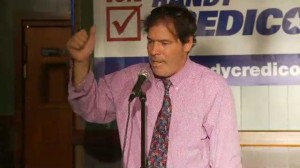 While Public Advocate Bill de Blasio anxiously awaits the results of Saturday’s recount to determine whether he will be forced into an October 1 runoff against former City Controller and 2009 Democratic mayoral nominee Bill Thompson, at least one of de Blasio’s lesser-known opponents in Tuesday’s crowded Democratic mayoral primary in New York City is already campaigning for votes in the autumn election.
While Public Advocate Bill de Blasio anxiously awaits the results of Saturday’s recount to determine whether he will be forced into an October 1 runoff against former City Controller and 2009 Democratic mayoral nominee Bill Thompson, at least one of de Blasio’s lesser-known opponents in Tuesday’s crowded Democratic mayoral primary in New York City is already campaigning for votes in the autumn election.
Political satirist Randy Credico, whose under-funded, bare-bones campaign unofficially garnered more than 13,000 votes on Tuesday while finishing thousands of votes ahead of two other Democratic mayoral candidates — including former city councilman Sal Albanese, who reportedly spent between $300,000-$400,000 on his long-shot candidacy — was the lone Democrat in the race who looked beyond the September primary and filed separate independent nominating petitions to compete in the November 5th general election.
Credico, 59, qualified for a separate line on the November ballot as the nominee of the newly-organized Tax Wall Street Party after his supporters obtained nearly 10,000 signatures on his nominating petitions.
The veteran civil rights activist and longtime director of the William Moses Kunstler Fund for Racial Justice whose Democratic primary campaign faced a virtual media blackout — the Huffington Post and the smug and jaded New York Times even refused to report his vote totals during their election night coverage — is expected to be one of more than a dozen independent and minor-party candidates competing in the general election.
“We are very pleased by Randy’s showing in Tuesday’s primary,” said Daniela Walls, acting chair of the national Tax Wall Street Party. “We’re absolutely thrilled with the numbers.”
Credico’s ambitiously progressive platform — ending the city’s unconstitutional “stop and frisk” practices, imposing a one-half of one percent tax on Wall Street transactions, a moratorium on foreclosures, free public transportation, and a Medicare-for-All program, among other things — really resonated in Tuesday’s primary, continued Walls, “particularly among voters who took the time and effort to carefully research the candidates and the issues.”
A Wall Street sales tax — an idea vigorously promoted by the United Front Against Austerity (UFAA), a citizens’ group founded late last year — could raise as much as $60 billion annually for New York City. That figure could be substantially higher if the trillions of dollars in trades on derivatives are factored in. (The NYC budget for Fiscal Year 2013, incidentally, amounted to just under $72 billion.)
If the hedge fund hyenas and greedy speculators — like pigs slopping around in the mud — were really paying their fair share, New York City wouldn’t be looking to trim its budget in 2014, as lame-duck Mayor Bloomberg, a billionaire who obviously overstayed his welcome, suggested in his initial $69.8 billion budget proposal for Fiscal Year 2014.
Bloomberg’s initial budget proposal for 2014 was more than $2 billion less than the city’s actual 2013 budget — a point eloquently made by City Controller John Liu, one of the nine Democratic candidates for mayor in last Tuesday’s primary.
Bloomberg’s original budget would have meant cuts in basic social services for the city’s poorest residents, those scrounging for their next meal in the land of plenty, and trimming expenditures for things like libraries and fire houses. He since revised it to slightly more than $70 billion.
That’s what austerity looks like.
Just don’t tax the pigs. After all, they’re the so-called “job creators,” except for the fact that they really haven’t created very many these past five years… For the record, fewer Americans are working now than at any time since 1979.
Too busy splashing around in the mud, one could assume.
It’s no secret that a mind-boggling 95% of the gains in income since the financial collapse have gone to the top one percent while most middle-income, working-class and poor Americans have yet to see any signs of a real economic recovery. Having lost their homes and their livelihoods, millions are far worse off than they were in September 2008.
Income inequality is more profound today than before the Wall Street-engineered crash.
And everybody knows it. They’re sort of a “silent majority,” to borrow a phrase from Richard Nixon.
They’ve been patiently waiting for something like the Tax Wall Street Party. It’s the Occupy Wall Street movement with substance, a movement with an economic program — and one that will be heard not in peaceful protests in city parks, but at the ballot box. That’s the only real power the people of this country, as individuals, still retain.
A leader-less protest movement — even one with humorous hand signals and clever chants — won’t bring change. Organizing and voting will.
As the late Eugene McCarthy once said, antiwar demonstrations and protests didn’t turn the country against the War in Vietnam in the late sixties. It was only by challenging LBJ in the snows of New Hampshire in the winter of 1968 that the tide began to turn against that illegal and immoral war.
From the nation’s most profound crisis over slavery to the widespread pain and suffering of the Great Depression, from Abe Lincoln to FDR, the ballot box has always been the American way. In fact, it’s the only way.
According to the NYC Campaign Finance Board, Credico spent less than $25,000 in his Democratic primary campaign, a tiny fraction of the tens of millions spent by his rivals.
In an interview with Uncovered Politics, Walls maintained that Credico’s modestly impressive vote total on Tuesday gives his third-party candidacy some momentum heading into the fall campaign.

Credico’s message is resonating and he could surprise a lot of people in November, said TWSP spokesperson Daniela Walls.
“While we can’t promise a stunning victory similar to Fiorello La Guardia’s successful fusion campaign during the Great Depression, or a spectacular come-from-behind win comparable to the late John V. Lindsay’s unlikely victory on the Liberal Party ticket in 1969 after losing the Republican primary, I think Randy is perfectly positioned to make some serious noise as a third-party candidate in November, especially against an unimaginative ‘faux progressive’ like Bill de Blasio and a Rudy Giuliani redux such as Joe Lhota,” said the soft-spoken Walls.
She might be right. New York has always liked a fighter, a combative and colorful personality willing to go the extra round for the city’s better self. Credico, she says, is such a person.
Unlike de Blasio, a Wall Street Democrat whose media-celebrated “Tale of Two Cities” candidacy is being championed and financed by the privileged elite, including hedge-fund billionaire George Soros and other obscenely wealthy Lords of Finance for whom the past five years have clearly been the “the best of times” — as Charles Dickens so aptly described it in his famous 1859 novel — Randy Credico appears to be the only candidate for mayor with a comprehensive economic program that speaks for the millions of ordinary New Yorkers for whom the current economic recovery hasn’t meant a damn thing.
For most New Yorkers — and for most middle-income, working-class and poor Americans, for that matter — the past five years have been a seemingly never-ending period of what the brilliant nineteenth-century English novelist and social critic described as “the worst of times.”
While those responsible for the 2008 financial meltdown prosper enormously during this so-called “recovery,” everybody else is struggling mightily just to make ends meet.
Bill de Blasio, whose lavishly media-hyped candidacy is being funded by an array of seedy slumlords, real estate developers and Wall Street parasites — the latter of whom have prospered outrageously in the aftermath of an economic crisis of their own making — won’t change any of that.
Given his previous public roles — serious-minded voters should really check out the rehab-loan scandal that took place in the department’s 203(k) program during his tenure as HUD’s regional director for New York and New Jersey in the Clinton Administration — the Big Apple is likely to become a dwarfed crab apple. The rehab-loan scams happened under his not-so-observant watch, and U.S. taxpayers were screwed.
On the other hand, if New Yorkers want to send a really powerful message — one that will be heard loud and clear from Wall Street to the White House — Credico could be the ideal messenger.
What recovery and for whom?
From the redwood forests of California to the pine tree-lined communities of Maine, the American people are looking to New York City, site of the once-promising Zuccotti Park Wall Street encampment in Lower Manhattan, to show the way…a sign that some people in this country still care about one another and are willing to strike a blow against the increasingly selfish and greedy investor class that destroyed our economy by casting an unexpectedly large protest vote for the penurious yet valiant Credico candidacy.



Follow Us